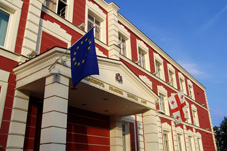
The Council of Justice does not publish information accessible by law
By Natalia Kochiashvili
Thursday, June 20
The applications for the vacancy of the Supreme Court judge was completed on May 31 and on that day NGO Transparency International-Georgia requested High Council of Justice Secretary to provide them with copies of all statements and documents submitted by every candidate. Two weeks later, NGO received a negative answer upon its request.
On June 19, the Coalition for Independent and Transparent Judiciary expressed its concern about the fact that the High Council of Justice does not provide the public with information about the judges of the Supreme Court. They state that his action is opposing the law.
“According to the amendments made to the Law on Common Courts on May 1, 2019, this information (except for health information) is public and accessible to everyone, and the Council breaks the law by its closure,” reads in a statement of June 19.
Coalition announces, that the Council of Justice refused to publicize the applications and attached documentation submitted by the candidates participating in the selection of the judges of the Supreme Court in the June 13 letter indicating the motivation for personal data protection; although this information is public according to the law.
“The board’s interpretation of the law poses a thorough suspicion that the Council is trying to hide information about certain candidates,” the Coalition said.
The Coalition calls on the Independent and Transparent Judiciary to “immediately publicize the information submitted to the Council on the candidates and information obtained by the Council (except for information about the health state) until the competition procedures continue.”
Must be noted that nowadays, the council’s website has published only brief biographical data of the candidates, and the society cannot verify the documentation and how true they are. Interested persons are not able to get acquainted with the materials submitted by candidates, including research, court decisions, and other important information that should be used to evaluate the competence and integrity of candidates.
It is noteworthy that the original version of the draft law envisaged the provision under which the data about the candidates should be confidential. After the provision caused sharp criticism, the Chairman of the Legal Committee, Anri Okhanashvili, stated that this entry would be changed and eventually it was withdrawn from the bill. The Venice Commission called on Parliament to maximize information on candidates as well.
The selection of Supreme Court judges has been an ongoing issue of Georgian political discourse for a long time. The issue of politically motivated judges has been a problem during the previous governments as well. Controversial judges were included in the nomination of 2018, which raised tensions even within the ruling party; consequently, some members of the majority have left “Georgian Dream.” After legislative work and new recommendations of the Venice Commission of 2019 and consultations, the process has restarted, and it is still going on. When the MP’s approve the nominated judges in the parliament, the political temperature is expected to rise again.


